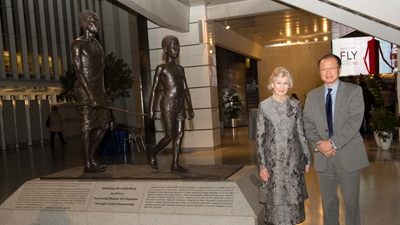WASHINGTON, November 17, 2012—Using community health systems to deliver treatments donated by the private sector, over 80 million people a year are now protected from river blindness in Africa. Fighting this disease, which causes much suffering and eventual loss of sight, was one of the World Bank’s first efforts in health, together with the World Health Organization (WHO) and other partners.
River blindness, which gets its name from the way it is transmitted—through flies that breed near fast-flowing rivers—has been controlled in large parts of West Africa, allowing families to return to 25 million hectares of arable land, enough to grow crops to feed 17 million people. The disease has been eliminated in several endemic areas, including transmission zones in Senegal and some areas of Mali, where preventive medication is now no longer required.
Learning from what worked in this effort and using the same system, the World Bank and many other partners are now working to push back all seven major neglected tropical diseases (NTDs) that can be prevented through medication (river blindness, elephantiasis, trachoma, roundworm, whipworm, hookworm, and bilharzia) but continue to place hundreds of millions of poor people at risk on the African continent.
“Hundreds of millions of children and adults in Africa live at risk of disfigurement, impaired development, blindness, and even death from seven major preventable so-called neglected tropical diseases, including river blindness, elephantiasis, trachoma and various types of intestinal parasites,” said World Bank President Jim Yong Kim at the opening of a November 16-18 conference in Washington DC: United to Combat NTDs: Translating the London Declaration into Action. “It’s not that these diseases really have been neglected. It’s the people who suffer from them who have been neglected,” Dr. Kim said. “Protecting poor people from preventable diseases that cause acute suffering remains at the heart of our mission to end poverty and boost shared prosperity.”
A key element of this extended effort is to strengthen community health systems in the endemic countries, through national health strategies that aim to reach every citizen with good quality health services.
Convened by The Bill & Melinda Gates Foundation, the US Agency for International Development, the UK’s Department for International Development, the World Bank, the World Health Organization and the Global Alliance to Eliminate Lymphatic Filarisis (GAELF), the Washington conference was a follow-up to a London meeting in January 2012. At that meeting, the private sector, civil society organizations, development partners and health experts agreed on a common vision to control or eliminate the world’s 10 major preventable neglected tropical diseases.
“It’s inspiring to see so many partners from different sectors coming together to build on their London Declaration commitments, and develop a plan for action moving forward," said Dr. Lance Gordon, Director for Neglected Infectious Diseases at the Bill & Melinda Gates Foundation. "Working together, we can deliver the drugs we have and accelerate development of urgently needed new ones — with the potential to benefit the hundreds of millions of people affected by NTDs worldwide."
At the London meeting, several pharmaceutical companies pledged to donate free treatments to protect people in Africa against nearly all the major preventable neglected tropical diseases. One such company is Merck & Co Inc., which for the last 25 years has donated Mectizan, ® a preventative treatment for river blindness.
“This year Merck is commemorating the 25th anniversary of the Mectizan® Donation Program and the progress toward eliminating two neglected diseases: onchocerciasis (river blindness) and lymphatic filariasis,” said Robert McMahon, Vice President, Merck & Co. “Although pharmaceutical companies discover, develop and donate medicines, distribution and funding mechanisms must be in place to get the treatments to the people who need them.”
A network of more than 15 civil society organizations has also played a very significant role in community-level services to fight these diseases. For example, development organization Sightsavers International, works to protect people against river blindness and trachoma in Africa.
Speaking at the Washington conference opener on November 16, Her Royal Highness Princess Alexandra, President of Sightsavers, said: “1.4 billion of the world’s poorest are affected by these debilitating and easily preventable diseases and Sightsavers is one of many organizations represented here this evening, working with partners to help these people each year.”
The current African Program for Onchocerciasis (river blindness) Control (APOC) trust fund has been managed by the World Bank since 1995, and the program implemented by the WHO. The APOC Board, which consists of Ministers of Health of endemic countries, has agreed to extend the life and purpose of this trust fund to 2025 to help address all of the preventable neglected tropical diseases.
“In Africa in general and in Burundi in particular, we deeply adhere to the London Declaration which contributes very significantly in our fight to break the vicious circle of poverty, disease and poverty through the elimination and eradication of NTDs,” said Dr. Sabine Ntakarutimana, Minister of Health and Social Welfare, Burundi. “Indeed we deeply believe that freedom from NTDs is a human right, equity and equality.”

